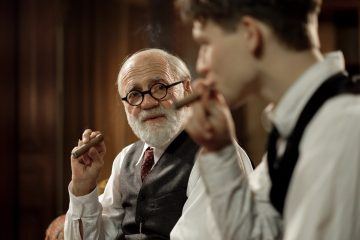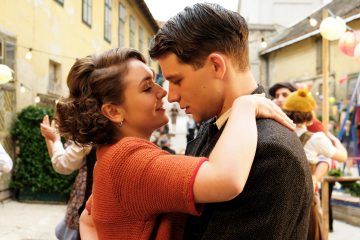by Alexander C. Kafka
The French scientist Pierre Curie, in the new film Radioactive, is impressed by a colleague’s paper on the magnetic properties of steel. It’s an apt reflection of his attraction to that steely colleague herself, the Polish-born Maria Sklodowska.
They become labmates, chisel through four tons of rock pitch over four years, and discover radium and polonium. In the process, they fall in love and fall ill from their glowing, deadly new atomic treasures.
Radioactive is a hybrid of traditional prestige-film grand biopic and quasi-psychedelic time travel. That peculiar combination — occasionally refreshing, more often distracting — speaks to the production’s parentage. Producer Paul Webster has to his credit decades of award-crowned major pictures like The English Patient and Atonement. This film is adapted by Jack Thorne from a graphic novel by Lauren Redniss, Radioactive: A Tale of Love and Fallout, and it is directed by the graphic novelist turned animated-film director Marjane Satrapi (Persepolis).
The result is a handsome, elaborate production, designed by Michael Carlin with cinematography by Anthony Dod Mantle, that chafes at the constrictions of its predominantly linear storytelling and finite historical elbow room. But reminding viewers that the Curies played both Prometheus and Pandora to the wonders and horrors of the atomic age feels unnecessary and vaguely patronizing.
We flash decades ahead to the Enola Gay’s dropping Little Boy on Hiroshima, to an early radiation therapy for a boy with cancer, to a Cold War Nevada test blast, and to the meltdown at Chernobyl. If any overt acknowledgement of the obvious were necessary, a postscript nodding to millions of lives lost to and gained from radiation would have sufficed without pulling us from the Curies’ more than sufficiently compelling and complicated tale.
On the other hand, the freedoms Satrapi and editor Stephane Roche grant themselves in conveying the principals’ inner lives, loves, hopes, and fears are quite intoxicating. With Budapest standing in for Paris, early on the filmmakers focus on Loie Fuller’s “Fire Dance,” an art nouveau attraction at the Folies Bergere that simultaneously establishes the spirit of the age and the film’s incendiary themes.
Rushes of quick-cut naturalistic and surreally scientific imagery sublimely suggest the moment of a child’s conception, the pride and terror of paradigm-altering discovery, the loneliness of widowhood and sickness. The visual trance is complemented by an enticing musical score by the brothers Evgueni and Sascha Galperine that alternates between tenderly romantic strings and hypnotic synthesizer gurgles. Those mirror the early-1900s’ beautiful, ambivalent pivot into scientific modernity.
In that transmutative era, radioactivity cast its unholy glow on untested cures, beauty treatments, fashions, theater devices, and spiritual parlor effects, at once seducing and poisoning its ardent fans. But it also, thanks in part to Marie Curie and her daughter Irene, worked its way onto World War I ambulances in the form of X-rays that helped soldiers avoid unnecessary amputations — a hint of the medical wonders the Curies had unlocked.
Rosamund Pike as Marie overacts in a couple scenes of lamentation but is generally well suited to the part. Radium “does not behave as it should,” she says, nor does Curie. We feel her outrage at her sexist treatment but also the overflow of pride with which she often sabotages her own professional prospects and happiness. She sleeps next to a talismanic vial of the lustrous magic element that she isolated. It comforts her even as it helps destroy her.
In Pike’s lively features, we glimpse a capacious mind and heart that want to devour a world she can’t trust. And why should she? One moment her public lauds her scientific achievement and oh-so-contemporary gumption. The next, society knocks her as “a dirty Pole who invented a poison” and scorns the sexual freedoms she insists on.
Sam Riley as a patient, bemused, and loving Pierre is equally affecting. More emotionally powerful than montages of Hiroshima or mushroom clouds in the desert is his ghost’s effort to console his partner in love, life, and science. “You threw a stone in the water,” the spirit says. “The ripples you can’t control.”
**
The Tobacconist is a 2018 film by Nikolaus Leytner newly out on demand in U.S. markets. It is adapted from a novel by Robert Seethaler and features a different early 20th-century icon, but this time in a tangential role.
When I first heard about the story of an Austrian lad from the Attersee hills who comes to late 1930’s Vienna and is counseled on life and love by none other than Sigmund Freud, I was intrigued but wary. Would the tale be akin to I.Q. (1994), in which another turn-of-the-century genius in later years, Walter Matthau as a cartoonish Albert Einstein, plays matchmaker to his brilliant niece?
Fortunately not. That was a gaudy, wobbly comedy; this is a melancholy coming-of-age story. The acclaimed Bruno Ganz, in his last film role before he died of cancer in 2019, is a gentle old soul as Freud. Ganz is perhaps best known

to international audiences for his turn as Hitler in the 2004 drama Downfall. If you recall his foam-at-the-mouth ranting in that picture, you’ll hardly recognize him here as the exalted but exhausted father of psychoanalysis about to flee to England to escape the Nazis. His is a quiet, watchful performance, a supporting role in the best sense.
He has a grandfatherly chemistry with Simon Morze, the young Franz who has come to the big city to apprentice to tobacconist Otto (Johannes Krisch in a resolute, absorbing portrayal). Sometimes a cigar shop is just a cigar shop, but here it reflects pleasure, libido, guilt, and perspective. In short, maturity — but one stamped with mortality’s imprimatur, like the heavy smoker’s exchange of bliss for doom. “A bad cigar tastes like horse shit,” Otto tells Franz. “A good cigar tastes like tobacco. But a very good cigar tastes like the world.”
Otto’s is a shop of dreams. The sophistication of a glamorous woman’s dragon stream of smoke through lipstick. Fantasies of an exotic Cuba from an idealized picture on a box of aromatic hand-rolled Havanas. The masturbatory fever incited by a locked drawer full of enticing nudie magazines.
“Shame and pleasure are siblings,” Freud observes to Franz, and at the tobacconist’s those siblings share a claustrophobic, uneasy realm.
There Otto presides with crutches and one leg. He lost the other in a World War I trench, but that doesn’t shield him from persecution by his right-wing neighbors or the local police, who collaborate hand in leather glove with the SS. He graciously serves Jewish and Communist customers and carries politically diverse newspapers, but not the Nazi one.

Seeking to do more than fantasize, egged on by Freud, Franz approaches a young woman, Anezka (a slyly commanding Emma Drogunova) at a street fair. They dance and Franz becomes obsessed with her. She is a Bohemian, literally, but also has the beguiling otherness, earthiness, and moral flexibility the word connotes.
Combine Freud’s spell with Anezka’s and the result is Franz’s dream life, rendered in coolly colored sequences heavy on floating, sinking, flying, and falling. He dutifully records these subconscious voyages in a journal that takes on an exhibitionist cast as Franz attempts to leave his mark on the world.
The question is whether he can do so and live to celebrate it.
The film’s production quality is uneven. Its street scenes vivify prewar Vienna, but the dream sequences feel like CGI on the cheap. Little details like unconvincing snow in which Franz and Anezka frolic tear the fabric of historical illusion. The script also feels underfed. Although we are privy to Franz’s dream life and romantic and sexual confessions, his intellect and motivations remain somewhat enigmatic.
Still, however imperfect, this meditation on power and self-realization lingers in the viewer’s imagination, like the whiff of bittersweet tobacco from a recently departed friend.
